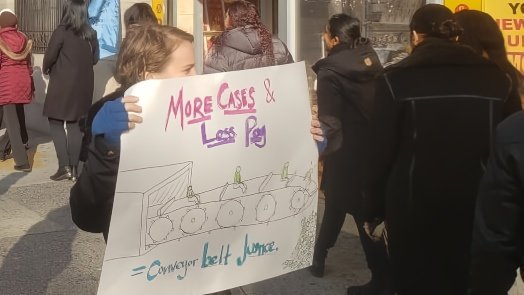The Ethical Duty to Strike
by Navruz Baum
Workers picket during the 2019 CAMBA contract campaign
On July 2nd 1973, workers at the Legal Aid Society went on strike demanding continuity of representation. At the time, clients were represented by a different attorney at each appearance. When a client walked into court, a harried defense attorney would scramble to piece together a case they were seeing for the first time. Over the course of their case, a client might be represented by five or six different attorneys. Meanwhile, the client’s freedom was at stake.
Ten years earlier, the Supreme Court had promised criminal defendants equal representation in Gideon v. Wainwright. Yet, as of July 2nd 1973, this promise remained unfulfilled. Workers at the Legal Aid Society begged management to implement continuity of representation. When they refused, the workers supported a lawsuit brought by clients demanding the Legal Aid Society improve representation. However, the courts labeled fragmented representation a “necessary budget-saving device” and ultimately dismissed the case.
After watching both management and the courts refuse to stand up for clients, workers took matters into their own hands and went on strike. For six days, they refused to enter appearances, file motions, or staff arraignments. Judges accused the workers of abandoning their clients. Management swore they’d never fold. But the workers stood strong and on July 9th management agreed to continuity of representation within the same court, and to seek funding for continuity of representation between different courts. As enforcement, the agreement required management to terminate their criminal defense contract with the city if they failed to secure this funding.
Everyone from management to judges accused the workers of violating their ethical duties by walking out. But this strike was motivated by a bold premise: as legal services workers, our ethical duty is not to simply sign retainers with empty promises of competent representation. Our ethical duty is to transform our sector so that it provides competent representation to every client, present and future. Our ethical duty is to fight for true justice for every member of the working class.
In recent years, a slew of new laws from right to counsel for tenants being evicted from their homes, to requirements that prosecutors turn over relevant evidence in a timely fashion, have promised to expand due process. But these laws aren’t worth the paper they’re printed on if legal services workers are too overburdened and turn over too quickly to implement them.
Much like in 1973, management, courts, and legislators are all refusing to act. And, also like in 1973, workers are taking matters into their own hands. In 2019, workers at CAMBA struck for four weeks and won a salary step system that has allowed workers to stay longer, gain more experience, and better serve clients. In early 2023, workers at NYLAG struck for two days and won their first workload standard. A few months later, workers at CLC struck for three days and won significant raises. In 2024, workers at MFJ struck for twelve weeks and won a $60,000 salary floor.
Workers at all of these organizations defied management attempts to pit worker and client interests against each other. They determined they had an ethical duty to strike. Workers at MFJ even determined that management has an ethical duty which they breached by withholding a fair contract and forcing workers to strike. They noted that retainers promise representation from the employer and the executive director, with workers merely “of counsel.” These theories have been validated by the New York Bar which has never disciplined an attorney for going on strike, and by the NYC Comptroller which opened an investigation into “MFJ management’s failure to reach a resolution with their employees.”
Despite recent wins, legal services continue to fall short of providing full justice. The recent National Public Defense Workload Study found that current workload standards violate ethics rules. The “right” in Right to Counsel remains a slogan. Too often clients in immigration, family defense, and other courts do not receive the representation they deserve. The ethical violations are clear, as is our ethical duty to strike for true justice. The only question that remains is whether we are willing to fulfill that duty.

